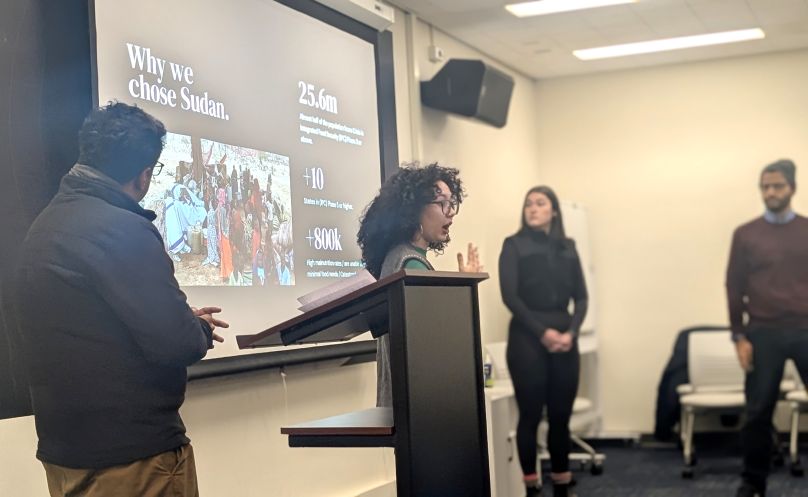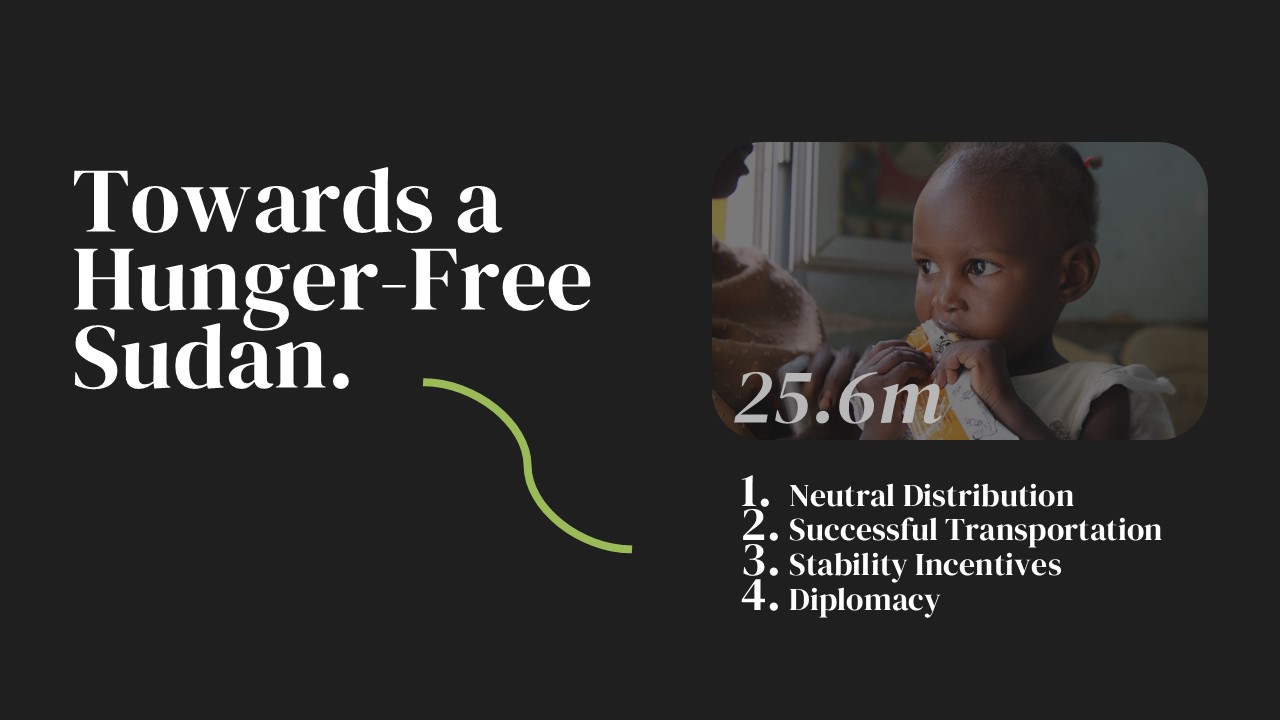Reppy Institute Peace Puzzle Hackathon Winner: "Hunger in Sudan"

Proseminar in Peace Studies completed its fall 2024 semester with the Peace Puzzle Hackathon. The class is offered again in the spring.
Student groups were tasked with finding a solution to reduce food insecurity for civilians in regions that are or have historically been vulnerable to armed conflict. Students Kathryn McGinnis, Basim Ali, Yangzom Tenzin, and Esam Boraey were voted the winning group for their presentation on Sudan.
“We chose Sudan as our case study for mitigating hunger in conflict zones because it is a country that has been severely affected by both conflict and famine.”
According to the group, since receiving its independence in the 1950s, Sudan has been gripped by civil war. The group’s presentation examined the severe food insecurity crisis affecting millions, rooted in decades of conflict, political instability, and disrupted aid distribution. According to the Integrated Food Security Phase Classification, almost 800,000 people in Sudan experience high rates of malnutrition or are unable to meet minimal food needs.
According to the group, mitigating hunger in Sudan will ultimately begin with ending the decades of armed conflict and destruction. However, focusing on short-term strategies, the UN can implement programs to increase civilians’ access to food and medical supplies on the long road to peace. The group proposed a multiphase strategy to mitigate hunger while laying the foundation for peace.
Neutral Food Distribution
International organizations claim the most significant obstacles to consistent humanitarian assistance in Sudan are the raids on food supplies and destroyed infrastructure for food transportation. The group proposed establishing UN-led food distribution routes through neighboring neutral countries like Chad, Egypt, and South Sudan to rectify this issue. In addition, they argued that deploying foreign nationals with direct stakes in the conflict, such as Russia, China, and the U.S., to secure supply lines would deter Russian or Chinese-backed regional actors from disrupting relief operations.
“The contingent of peacekeepers for these operations should be primarily assigned from Russian, Chinese, UAE, and Saudi Arabian soldiers because their countries are funding this conflict.”
However, this drew significant debate, with some students questioning the risks of involving such stakeholders in food distribution. The group maintained that such an approach deters disruptions to relief operations and compels these actors to take responsibility for resolving the crisis. UN peacekeepers and humanitarian workers would secure these routes and oversee aid distribution, maintaining strict neutrality.
Rapid Infrastructure Rebuilding and Local Incentives
The group proposed collaboration with trusted entities like the Programme for Infrastructure Development in Africa (PIDA) during the rapid infrastructure rebuilding phase. According to the group, an engineering contingent should be integrated to rapidly rebuild temporary infrastructure like bridges to enable aid delivery to hard-to-reach areas to ensure successful transportation.
“To incentivize local cooperation and stability, the initiative would collaborate with existing programs like PIDA to invest in permanent infrastructure in regions where food distribution succeeds.”
Similarly, students raised concerns about whether infrastructure investments might unintentionally favor one side of the civil war. In response, the group explained that their incentives measure ensures aid is distributed equitably and promotes accountability and cooperation across all regions. This bold and complex strategy they elaborated, seeks to align global interests with Sudan's immediate needs, providing short-term food security and a pathway toward lasting stability.
Diplomatic Solutions
The group concluded their presentation by asserting the importance of diplomatic efforts in overcoming the challenges and bureaucratic obstacles that hinder aid efforts. They proposed continuous adaptation to the dynamic situations on the ground and enhanced coordination between UN agencies, NGOs, and local partners to maximize efficiency and avoid effort duplication.
Learn more about the Reppy Institute for Peace and Conflict Studies Program.

